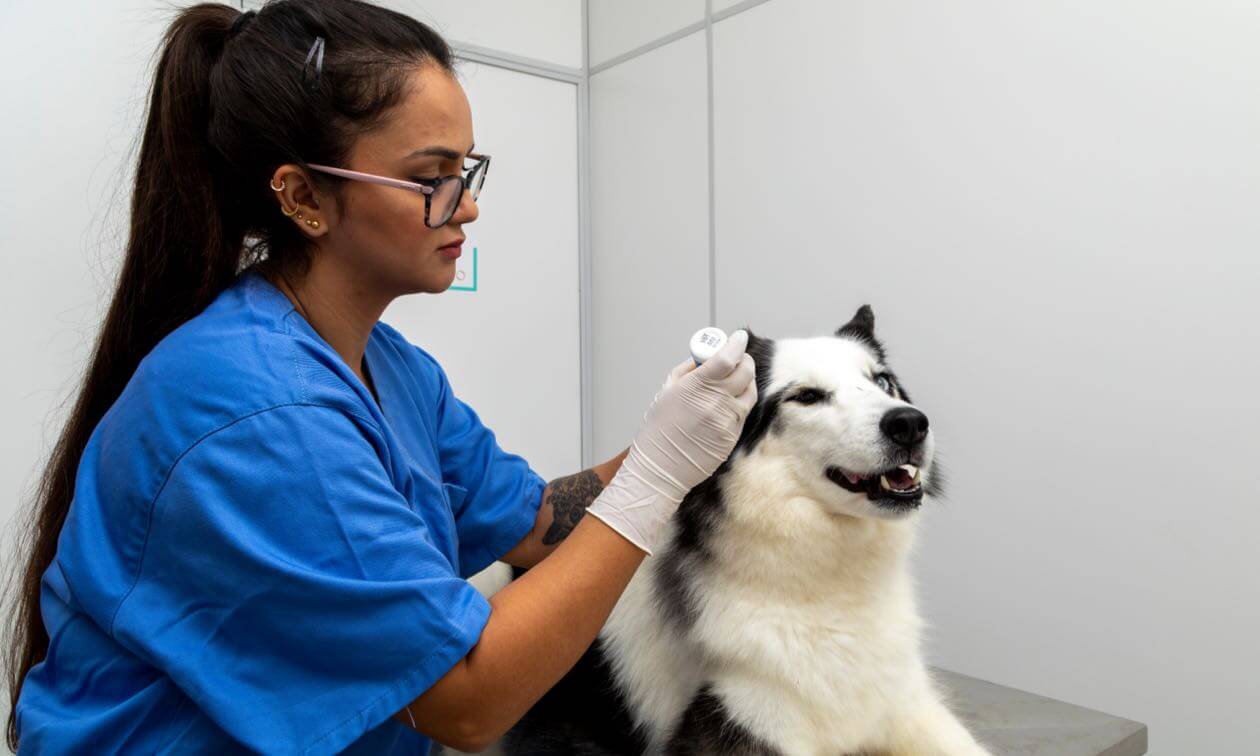Comprehensive Guide to the Providers Used by a Veterinary Oncologist
Vet oncology includes a wide array of solutions focused on dealing with and diagnosing cancer cells in family pets. Veterinary Oncologist. Oncologists use advanced analysis strategies and use various treatment choices tailored to every animal's demands. They additionally prioritize supportive care and supply valuable resources for pet dog owners. Comprehending these solutions is necessary for making informed choices. What specific elements of veterinary oncology can notably influence a pet's therapy trip?
Understanding Veterinary Oncology
Veterinary oncology is a customized area concentrated on treating and identifying cancer in animals. This discipline incorporates a vast array of approaches, from clinical therapies such as chemotherapy and immunotherapy to surgical treatments aimed at removing lumps. Vet oncologists are trained to acknowledge the special manifestations of cancer cells in various species, allowing them to tailor therapy strategies to individual patients.
In enhancement to standard therapies, veterinary oncology highlights helpful care, which plays a vital duty in enhancing the lifestyle for affected animals. This includes pain management, dietary assistance, and palliative care alternatives. Partnership with family pet owners is essential, as they are indispensable to decision-making concerning their pets' treatment paths. As research study advances, veterinary oncology continues to develop, providing new hope and boosted results for pets identified with cancer cells. Generally, this field is essential for resolving the intricacies of cancer cells in friend pets.
Advanced Diagnostic Techniques
Advanced analysis techniques play a vital function in vet oncology, giving vital insights right into the presence and level of cancer in animals. Imaging methods such as ultrasound, CT scans, and MRI are generally used to imagine tumors and assess their attributes. Furthermore, biopsy procedures are necessary for acquiring cells samples, enabling for clear-cut medical diagnosis and tailored treatment plans.
Imaging Modalities Utilized
Imaging modalities play an important role in the medical diagnosis and management of cancer cells in animals. Veterinary oncologists use different sophisticated imaging techniques to examine tumor metastasis, visibility, and size. Radiography, or X-rays, supplies a preliminary view of bone and chest problems, while ultrasound provides real-time imaging of soft tissues, permitting thorough examination of inner organs. Calculated tomography (CT) boosts visualization of complex physiological frameworks and allows 3D repairs, aiding in exact lump localization. Magnetic resonance imaging (MRI) is vital for soft cells distinction, particularly in brain lumps. In addition, nuclear medicine methods such as positron exhaust tomography (ANIMAL) assistance recognize metabolic task within tumors. Collectively, these techniques improve analysis precision, guiding efficient treatment methods for oncological people.
Biopsy Procedures Discussed
Complying with the first analysis via imaging modalities, obtaining a conclusive medical diagnosis usually calls for cells tasting via biopsy treatments. Veterinary oncologists utilize various biopsy techniques based on the tumor's location and qualities. Fine needle ambition (FNA) is a minimally intrusive technique that draws out cells for cytological assessment, suitable for shallow masses. Core needle biopsies give bigger cells examples and serve for much deeper growths, allowing for histopathological analysis. Surgical biopsies entail excising a section or the whole growth, assisting in complete evaluation. These procedures not just validate the existence of cancer but also aid establish its kind and grade, directing treatment choices. Each biopsy technique is chosen thoroughly to balance analysis precision with client safety and convenience.
Therapy Options for Cancer Cells in Animals
When an animal is detected with cancer, a selection of treatment alternatives end up being readily available to assist manage the illness and improve quality of life. Vet oncologists usually recommend a multidisciplinary technique customized to the private pet dog's needs, which might include surgical treatment, radiation therapy, immunotherapy, or alternate treatments.
Surgery is commonly employed to eliminate lumps and affected tissues, possibly leading to complete remission sometimes. Radiation therapy aims to target and damage cancer cells, decreasing growth dimension and alleviating signs - Veterinary Oncology Services. Immunotherapy uses the pet's immune system to combat cancer cells better, while alternative therapies might consist of acupuncture or natural supplements to sustain general health
Each treatment option brings its very own advantages and risks, and vet oncologists work closely with pet owners to make an extensive strategy that lines up with the family pet's certain medical diagnosis and the proprietor's desires. The utmost objective is to improve the family pet's convenience and top quality of life throughout their cancer trip.
Chemotherapy for Animals
Chemotherapy is a common treatment option for family pets identified with cancer and is typically utilized together with various other treatments detailed by veterinary oncologists. This treatment involves the management of certain medicines made to target and damage cancer cells, consequently minimizing tumor dimension and preventing the spread of the condition. Vet oncologists tailor chemotherapy methods based upon the type of cancer cells, the pet dog's total see this here health and wellness, and the desired therapy result.
Negative effects can take place, as these medicines may also influence healthy cells. Common responses include nausea, throwing up, and short-term changes in hunger - Veterinary Cancer Specialist. Veterinary oncologists are outfitted to handle these adverse effects successfully, guaranteeing the pet's comfort throughout the therapy process. Normal tracking through blood examinations and follow-up appointments is vital to evaluate the pet dog's reaction to radiation treatment and make required changes. Eventually, radiation treatment can provide considerable advantages, improving the top quality of life for animals encountering cancer medical diagnoses

Radiation Treatment in Veterinary Medication
Radiation therapy acts as a reliable treatment alternative for animals diagnosed with local growths, providing a targeted strategy to cancer management. This strategy utilizes high-energy radiation to harm the DNA of cancer cells, preventing their ability to multiply. It is specifically beneficial for growths that are not amenable to medical removal or for situations where surgical treatment might not be feasible due to the lump's place.
Veterinary oncologists customize radiation protocols based upon tumor size, kind, and area, along with the pet dog's general wellness. Treatment can be provided via outside light beam radiation or brachytherapy, each with distinct benefits. Usually, numerous sessions are required to make best use of effectiveness while lessening side effects.
Family pets may experience momentary reactions such as skin inflammation, the general goal is to reduce lumps and alleviate symptoms, ultimately enhancing the pet dog's diagnosis and top quality of life. Accordingly, radiation therapy plays a vital function in complete cancer cells treatment.
Palliative Treatment and Top Quality of Life
Palliative treatment in vet oncology concentrates on improving the lifestyle for pet dogs facing incurable ailments, making certain convenience and self-respect in their last days. This specific technique focuses on pain administration, symptom control, and emotional assistance. Vet oncologists examine each family pet's specific requirements, tailoring interventions to alleviate pain and boost general well-being.
Techniques may consist of carrying out medicines for pain alleviation, taking care of queasiness, and dealing with other distressing signs. In addition, nutritional support is usually given to preserve stamina and enhance cravings. The psychological facet of palliative care is just as crucial; producing a tranquil atmosphere helps lower anxiousness for both animal and proprietor.
Eventually, the goal of palliative treatment is to allow pet dogs to enjoy their remaining time with as much pleasure and dignity as feasible. By concentrating on convenience and lifestyle, vet oncologists play a necessary function in ensuring that family pets and their families browse this challenging journey with concern and understanding.
Support for Pet Dog Owners Throughout Therapy

Psychological Assistance for Proprietors
Charting the emotional landscape throughout an animal's cancer cells treatment can be an overwhelming experience for owners. The uncertainty surrounding medical diagnosis and prognosis can bring about feelings of read this post here anxiousness, unhappiness, and vulnerability. Veterinary oncologists identify the importance of emotional assistance and often offer advice to help owners browse this difficult trip. Communication is important; reviewing treatment choices and possible end results can reduce some concerns. In addition, offering peace of mind that emotional actions are legitimate fosters a supportive atmosphere. Lots of oncology facilities may also suggest assistance teams or therapy solutions customized for pet dog proprietors, helping with common experiences. Urging proprietors to focus on self-care throughout this moment is essential, as their psychological health straight influences their pet's comfort and overall treatment experience.

Resources and Educational Materials
Steering through the intricacies of a pet dog's cancer cells treatment can be intimidating for owners, making accessibility to trusted sources and academic materials important. Vet oncologists usually supply a range of handouts, brochures, and online products that describe treatment alternatives, prospective adverse effects, and treatment methods. These resources aid debunk the process and encourage animal proprietors to make educated choices. Furthermore, numerous oncology clinics use access to sustain groups and discussion forums where owners can get in touch with others dealing with comparable difficulties, fostering a feeling of community. Educational seminars and webinars carried out by veterinary experts further improve understanding, guaranteeing that proprietors are fully equipped to browse their pet's journey with cancer cells treatment with self-confidence and knowledge.
Often Asked Inquiries
How Can I Prepare My Family Pet for a Veterinary Oncology See?
Preparing a family pet for a vet oncology go to involves celebration clinical records, noting symptoms, and making certain the animal is comfy. A calm demeanor and familiar products can aid ease stress and anxiety during the visit.
What Are the Signs My Animal May Have Cancer Cells?
Indicators that a family pet might have cancer cells include unexplained weight loss, persistent vomiting or diarrhea, uncommon swellings or swellings, sleepiness, adjustments in appetite, difficulty breathing, and alterations in behavior. Trigger veterinary interest is essential.
How Can I Support My Animal Mentally During Treatment?
Supporting an animal mentally during treatment includes supplying comfort, preserving routines, providing gentle affection, and making sure a calm setting. Taking part in quiet play and normal friendship aids ease stress and anxiety and promotes a complacency.
Are There Alternative Therapies for Pet Dogs With Cancer cells?
Alternate therapies for family pets with cancer include acupuncture, herbal therapies, and nutritional support. These strategies might match traditional therapies, advertising general well-being. Consulting with a vet is necessary for risk-free and effective assimilation of alternate therapies.
What Prices Should I Anticipate for Vet Oncology Solutions?
The anticipated prices for veterinary oncology solutions can differ considerably, often influenced by diagnostics, therapies, and recurring care. Pet proprietors must prepare for expenditures ranging from consultations to specialized treatments, reflecting recommended you read the intricacy of cancer monitoring.
Partnership with pet proprietors is essential, as they are indispensable to decision-making regarding their pet dogs' treatment courses. Each treatment choice brings its own benefits and threats, and veterinary oncologists function closely with family pet owners to make a detailed plan that lines up with the pet's particular medical diagnosis and the owner's desires. Pet dogs may experience short-lived reactions such as skin inflammation, the total aim is to diminish growths and alleviate signs, ultimately enhancing the pet's prognosis and high quality of life. Assistance for pet dog owners during treatment is vital in steering with the psychological obstacles associated with an animal's cancer medical diagnosis. Preparing a pet dog for a vet oncology go to includes celebration clinical documents, keeping in mind signs and symptoms, and ensuring the animal is comfortable.